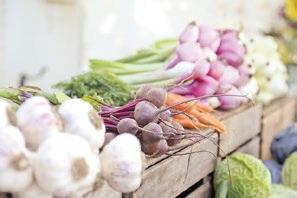
2 minute read
Farming figures
X Farming Figures
A look at… some farming issues that emerged during Covid-19… told through some key statistics
£2/kg
Spike in Welsh prime lamb liveweight auction prices despite EU trade fears; prime cattle 15p/kg up on 5-year ave
2.23m viewers Channel 5’s Our Yorkshire Farm audience, topping 9pm prime-time slot on Aug 11
2,260t of carbon/year Sequestration by NT’s Wimpole Farm
$32billion Record 2020 US farm support, inc Covid-19 & US/China trade war aid. $50bn by 2023
Almost a Quarter Fall in food exports to EU due to non-tariff barriers (paperwork etc) even with an FTA
0.4% Water in UK beef production classed ‘blue’ (surface/ground), below most imports
50% rise Jump in 2020 summer roast beef dinners
7m-high
£120m 28ha glasshouses in Norfolk set to grow 1-in-10 UK tomatoes on high trellises
81% FWi users seeing Covid-19 rural crime rise
9 in 10 Farm shops selling more in Covid crisis, 80% adding click-n-collect and 2/3 home delivery
Sources: FW, FG, NFU, Farm Retail Association, Kantar World Panel, Defra
EU public backs CAP

AS UK farming bids farewell to the EU’s Common Agricultural Policy new data shows nearly three out of four Europeans are aware of the CAP and believe all citizens benefit from it, and over half want more money spending on farmers. The EU-wide Eurobarometer survey quizzed over 27,000 respondents from 27 Member States, of which 95% felt agriculture and rural areas were important for their future, with 6% more aware of the CAP than in 2017, and 15% more thinking it benefits all citizens, not just farmers. Almost two in five people felt support for farmers was too low, up from 26% in 2017 to 39% now, with more than half feeling CAP spending should rise over the next ten years, 12% more than in 2017, and 27% ahead of 2007. Views on what the main objectives of the CAP should be were little changed, most believing that providing safe, healthy food of high quality should be the priority (62%), with 52% saying it should also protect the environment and tackle climate change, as well as ensuring a fair standard of living for farmers (51%). Four in five respondents felt the EU was meeting its objective of providing food security, 8% better than 2017.
Although a growing split believe agriculture is one of the major causes of climate change (up from 29% in 2010 to 42% in 2020), most believe agriculture has already made a major contribution in fighting climate change (55%), up from 46% in 2010. More citizens are now aware of the organic farming logo (56%), almost a third more than in 2017.
Reflecting on rural issues respondents rated as ‘good’ the environment and landscape (82%), access to leisure and cultural activities (56%) and educational facilities (54%). Access to high speed internet was highlighted as the greatest improvement in rural areas (55% agree), while job opportunities had become worse (42% agree).
INSECT-BASED FEED
Insect-based feeds for farmed animals could help the UK reach its net zero carbon emissions target, researchers say. A project led by Entec Nutrition – set up by two University of Exeter scientists – has won a £250,000 grant from the Innovate UK’s Transforming Food Production scheme to explore the science behind insect-based feeds for poultry and aquaculture. It is seen as a sustainable alternative to energy-intensive global feeds, which rely on volatile international imports often linked to deforestation.










